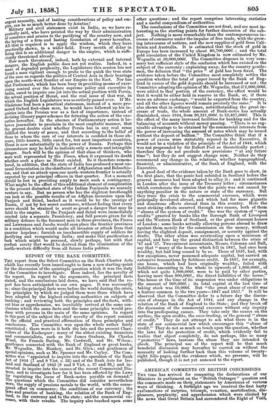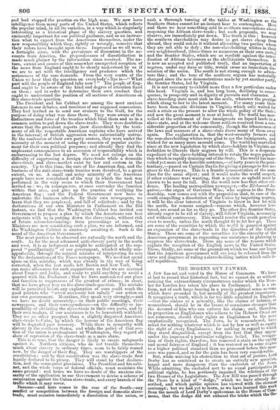AMERICAN COMMENTS ON BRITISH CONCESSIONS TRH time has arrived for
comparing the declarations of our Ministers in parliament on the "British Outrages" question and the comments made on their statements by Americans of various ways of thinking. A foritlifght ago we received the first hasty exclamations of surprise, triumph, vexation, mortification, dis- pleasure, perplexity, and apprehension which were elicited by the news that Great Britain had surrendered the Right of Visit, and had stopped the practice on the high seas. We now have intelligence from many parts of the United States, which reflects the popular mind, in all its varieties, in a way which is sin,gularly interesting as a historical phase of the slavery question, and eminently important for our political guidance, and as an instruc- tion what to expect from the Americans themselves, under the new responsibility which they, rightly or wrongly, conceive that their rulers have brought upon them. Impressed as we all were, a fortni,ght since, with the prevalence of discontent in the ac- counts from America, the preponderance of dissatisfaction is made much plainer by the information since received. The na- ture, extent and causes of this somewhat unexpected reception of the news from England ought to be dearly understood by us if we are to act with the intelligence and prudence which the seriousness of the case demands. From the very centre of the -Union we hear that the question on every body's lips is—" What wt will the people of England take now ? " The people of Eng- land ought to be aware of the kind and degree of attention fixed on them ; and in order to determine their own conduct they ought to understand the position of all sections of Americans on this slave-trade question. The President and his Cabinet are among the most anxious listeners to our debates, and receivers of our supposed concessions. They had invited us to send our cruisers to the Gulf, for the purpose of doing what was done there. They were aware of the distinctness and force- of the treaties which bind them and us in a ooramon action to put down the slave-trade. They were doubtless aware that the prevalent reports (now discredited by the testi- mony of all the respectable American captains who have arrived in the interval) of British aggression were substantially untrue. By the confession of their own party orators, they were under the necessity at the moment of using the occasion of popular excite- ment for their own political purposes ; and already they find the unpleasant consequences in an accession of responsibility which is embarrassing to the last degree. We need. not enlarge on the difficulty of suppressing a foreign slave-trade while a domestic slave-trade and slave-market exist by law and custom in the country. Up to this time, the care of the American flag, and the business of the anti-slave-trade treaties were devolved, to a great extent, on us. A small and noisy minority of the American people have now complained of the way in which the task was performed in the very scene to which their Government had invited us : we, in consequence, at once surrender the function within that area, and give up the practice of verifying the American flag : and the Federal Government now have to undertake the business afresh. By their own newspapers, we learn that they are perplexed, and full of solicitude ; and by the declarations of our own Ministers in Parliament on the 22d instant, we find that the Washington Cabinet has invited our Government to propose a plan by which the Americans can best cooperate with us in putting down the slave-trade, without risk of future misunderstandings from proceedings at sea. Our Ministers are now considering such a plan, we are informed, and the Washington Cabinet is anxiously awaiting it. Such is the mood of the American Government.
The next parties to be observed are naturally the north and the south. As for the most advanced anti-slavery party in the north and west, it is as indignant as might be anticipated at the sup- posed " pusillanimity " of our government, which it wholly mis- apprehends, through the natural mistake of interpreting its acts by the declamations of the Times newspaper. We need not spend space on this mistake, which was already in the way of being corrected, when the last mails left Boston and New York. We can make allowance for such suppositions as that we are alarmed about France and India, and ready to yield anything to avoid a quarrel with Mr. Buchanan ; that ive have surrendered our place and function as suppressors of the greatest of crimes ; in short, that we have given way on the slave-trade question. The mistake will be perceived before any explanation of ours could reach the good patriots who "await anxiously but calmly" our action on our own government. Meantime, they speak very strongly,—and we have no doubt accurately,—in their public meetings, their newspapers, and their correspondence—on the difficulty or im- possibility of obviating the slave-trade in their own ports, and by their own traders, if our assistance is to be henceforth withheld. They see no other prospect than a slightly disguised American slave-trade to Cuba, by which the honour of the American flag will be degraded past recovery. While there is sympathy with slavery in the southern States, and while the policy of that sec- tion of the union is predominant at Washington, they regard all show of repression of the slave-trade as a mere sham.
This is so true, that the danger is likely to create safeguards against it. Northern citizens, who do not trouble themselves much about slavery in ordinary times, seem to be fairly roused now, by the danger of their flag. They are worshippers of the constitution; and by that constitution was the slave-trade first legally declared to be piracy. They will stand by that declara- tion, and the consequent provisions. The President and his cabi- net, and the whole corps of federal officials, must maintain the same ground : and hence we have no doubt of the anxious sin- cerity of the application to our Government to devise a scheme of Cooperation against the Cuban slave-trade, and every branch of the traffic which it may cover.
Because—and here comes in the case of the South—any conflict or competition between the foreign and d.omestie slave- trade, must occasion immediately a dissolution of the union, or
such a thorough turning of the tables at Washington as th; Southern States cannot for an instant bear to contemplate. Here and there we hear something said in southern conventions about reopening the African slave-trade ; but such proposals, we may observe, are immediately put down. The truth is this : however the southern slaveholders may desire to get slaves cheap from abroad, they could not do it without alienating two parties whom they are not able to defy ; the non-slaveholding whites in their own neighbourhood, (three times as numerous as their own caste,) and the frontier States, -which are as resolute against the intro- duction of African labourers as the abolitionists themselves. It is now an accepted and published truth, that an importation of negroes, under any form or title, would cause an immediate dis- solution of the union. The south is not strong enough to adven- ture this ; and the tone of the southern organs has materially changed since the new demonstrations made by yet another party, the frontier States, led by Virginia. It is not necessary to exhibit more than a few particulars under this head. Virginia is, and has long been, declinino.° in conse- quence, in prosperity and in dignity of pursuits and character. A slave-breeding state must sink in the scale, whatever the prestige which clung to her to the latest moment. For many years there have been domestic divisions in Virginia which only waited for such a crisis as the present to alter the whole policy of the State ; and now the great moment is near at hand. The world has mar- velled at the settlement of free immigrants on lapsed lands in a slave-state, and at the welcome those settlers received from a con- siderable proportion of the community, though the irksomeness of the laws and manners of a slave-state drove many of them away again. The explanation is, that the west-country farmers and the non-slaveholding whites were glad. to see the immigrants, and wished for as many more as could tome. The world.has marvelled since at the new legislation by which slave-holders in Virginia are forbidden to liberate their negroes by will. This is a desperate expedient of the slave-holding interest to retain the negm popula- tion which is rapidly draining out of the State. The world has mar- velled yet more at the horrible sentence,—of forty years in the peni- tentiary,—passed. on Captain Baylis for giving apassage to five ne- groes to the Jerseys. This is a frantic demonstration of the same class for the same object; and it would make the world suspect, if other evidence were wanting, that a system so upheld must be known to be near its fall. But the world now has that other evi- dence. The leading metropolitan newspaper,--the Richmond In- quirer,—the organ of Governor Wise, who aspires to the Presi- dentsip, now comes out with the proposition that, in case of the south compelling a dissolution of the Union by importing negroes, it will be the clear interest of Virginia to throw in her lot with the north, for reasons assigned—reasons -which, however low- toned, are sound as far as they go. The other five frontier States, already einem. to be rid of slavery, will follow Virginia, ecessarily and without controversy. This would render the south powerless even to secede, unless the north thought fit to let her go. These are some of the securities by which the world is guarded against an expansion of the slave-trade in the direction of the United States. These are some of the securities for the sincerity of the American government in requesting our assistance in planning to suppress the slave-trade. These am a some of the reasons which explain the reception of the English _news in the United States. These, finally, are some of the groundson which we base our hopes that the American government will ere long be released from the curse and disgrace of ruling a slave-holding nation which calls it- self republican.



























 Previous page
Previous page